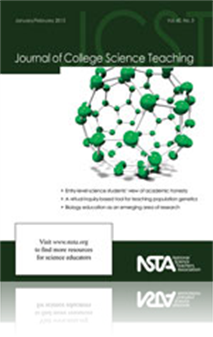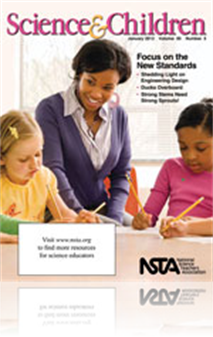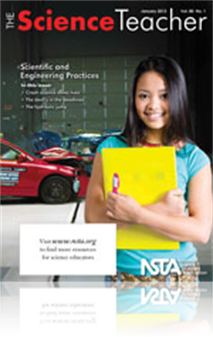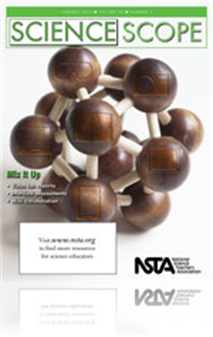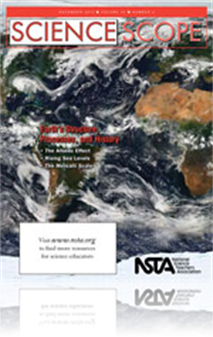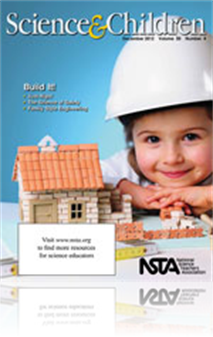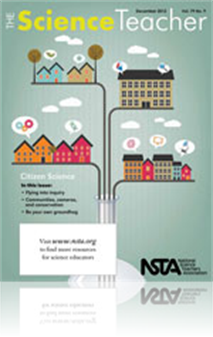All Resources
Journal Article
A Team Approach to Successful Learning: Peer Learning Coaches in Chemistry
Through weekly Team Approach to Successful Learning workshops, students learn and apply problem-solving strategies, coached by specially trained peer learning coaches....
Journal Article
Case Study: A Case of Respiratory Distress
This column provides original articles on innovations in case study teaching, assessment of the method, as well as case studies with teaching notes. This clinical case study pertaining to a patient with medication-induced hemoglobenia was developed a...
Journal Article
Teaching Through Trade Books: The Stealth Profession
This column includes activities inspired by children’s literature. This month’s issue gives students not only an awareness of the work of engineers but also the opportunity to think like engineers....
Journal Article
Science 2.0: Data Through the Air
This column shares web tools that support learning. This month’s issue discusses wireless interfaces and how they can be used in the science classroom....
Journal Article
Point of View: Judging Science-Fair Judges
This column shares reflections or thoughtful opinions on issues of broad interest to the community. This month’s issue discusses science fairs from the judge's point of view....
Journal Article
The Many Metaphors of Energy: Using Analogies as a Formative Assessment Tool
This article describes how student-generated analogies are shown to be an effective means of eliciting ideas about energy in systems from biology, chemistry, and physics....
Journal Article
Scope on Safety: Small Microbes Pose Big Problems
This column shares safety information for your classroom. This month’s issue discusses health risks from using harmful microbes in the lab....
Journal Article
Editorial: Just Ain't Happenin'
The Journal of College Science Teaching’s editor shares thoughts regarding the current issue....
Journal Article
Teacher's Toolkit: Helping Students Navigate Nonfiction Text: Paving the Way Toward Understanding
This column provides how-to strategies and practical advice for the science teacher. This month’s issue discusses the problem of students struggling with content-area reading....
Journal Article
Understanding Earth's Albedo Effect
Learn how the Earth's surface affects how our planet absorbs and reflects the energy of the Sun....
Journal Article
Methods and Strategies: Responding to the Need for Intervention
This column provides ideas and techniques to enhance your science teaching. This month’s issue talks about six easy steps to prime students for mastery of science concepts....
Journal Article
Making Sense of Dinosaur Tracks
Use observations and inferences to devise evidence-based explanations for sets of dinosaur tracks....
Journal Article
Safer Science: Dangers in a Dish
This column provides best safety practices for the science classroom and laboratory. This month’s issue discusses two documents that will help with safety of culturing with microorganisms....
Journal Article
The Early Years: Please Touch Museum
This column discusses resources and science topics related to students in grades preK to 2. This month’s issue discusses students making a "please touch" museum in the classroom or gathering a collection of materials in a supply box for making crea...
Journal Article
Editor's Corner: Science for All Citizens
The Science Teacher’s editor shares thoughts on the current issue....
Journal Article
Connecting Earth Systems: Developing Holistic Understanding Through the Earth-System-Science Model
Explore how the four Earth systems—the hydrosphere, atmosphere, biosphere, and lithosphere—interact and are impacted by human activity....
Journal Article
An engineering challenge seamlessly integrates science, technology, and math. Students try to build a PVC-pipe buoy that will support as many golf balls as possible while floating freely....
Journal Article
Exploring the Science Framework
This article discusses what it means for students to be mathematically proficient in the context of science and makes connections in math with the Common Core State Standards....
Journal Article
Scope on Safety: Turning Up the Heat on Safety
This column shares safety information for your classroom. This month’s issue discusses safety rules when using hot plates....
Journal Article
Formative Assessment Probes: Mountain Age: Creating a Classroom Profile
This column focuses on promoting learning through assessment. This month’s issue covers the concept of the role of weathering in shaping the features of mountains....
Journal Article
Health Wise: The Stress Response: The Good and the Bad
This column provides up-to-date information on current health topics—along with classroom activities that help students make healthy choices. In this month’s issue the author talks about the body's stress response....
Journal Article
Science Shorts: Is Concrete a Rock?
This column provides classic classroom activities that emphasize science process skills. In this month’s issue students learn about properties of materials....
Journal Article
Citizen Scientists: Investigating Science in the Community
This article describes numerous examples of citizen science projects that provide meaningful, authentic contexts for students to engage in the processes of science....
Journal Article
Teaming up with the larger school community and inviting families to learn alongside students has benefits for all. Students and their families learn to apply the engineering design process in a variety of contexts during a family engineering event....
Journal Article
Students design a model house and learn about the properties of materials. The "Design a Model House" challenge has students learning to describe, select, and test materials to solve a problem....
Journal Article
Investigating the Mercalli Intensity Scale Through "Lived Experience"
Shake up your class with a look at the intensity-based alternative to the Richter scale....
Journal Article
This article describes several different citizen science investigations in which students learn about adaptation, interactions among species and their environments and change over time—fundamental principles in biology....
Journal Article
Science 101: How Is Steel Made?
This column provides background science information for elementary teachers. This month’s issue discusses the properties of steel and how it is made....
Journal Article
Clear Skies Ahead! Clearing Up Confusion About Clouds
Discover how to identify different types of clouds and use them to predict future weather events....



